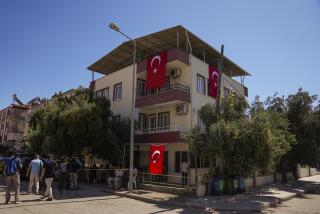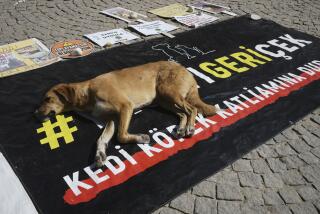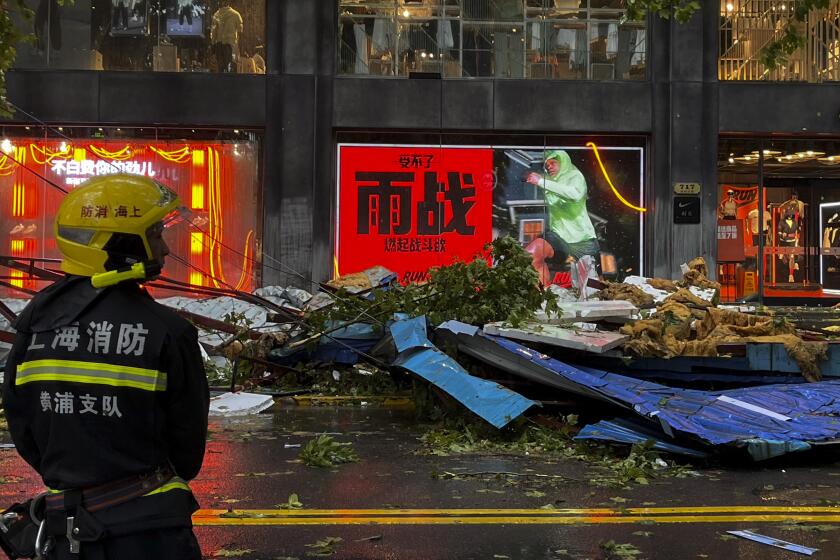Central Asian migrants caught in Turkey’s anti-terror raids
Reporting from Istanbul, Turkey — The last time Anurkhol Bipolotov saw her husband, Fakhriddin, was across a street, outside a police station in Istanbul, on March 9.
“He couldn’t speak, and I asked to speak with him, but they shouted, ‘You cannot speak.’ Then they sent him to Uzbekistan,” she recalled. “Now I have no idea where he is.”
That night, Turkish counter-terrorism police conducted 10 simultaneous raids across Istanbul, based on an anonymous tip placed to a hotline set up to report suspicious activity. Sixty-nine people, all but two foreigners, were taken into custody, suspected of being Islamic State members. Among them were 17 women and 29 children, including Bipolotov and her three children. None were ever charged with a terrorism-related crime.
Raids like these are increasingly common in Turkey, which has been under a state of emergency since July 2016. More than 50,000 people are in prison, many suspected of being involved in a failed coup last year or having ties to the Kurdistan Workers Party, which the government considers a terrorist group, or Islamic State, which Turkey had long been accused of ignoring.
In a single week this month, Turkish police carried out more than 1,400 raids across the country, detaining more than 1,167 people suspected of belonging to terrorist groups, and an additional 6,890 for being in the country illegally.
“Turkey is doing more about Islamic State than they did a few years ago, which is good, but how many innocent people are being caught up in it, we don’t know,” said Gareth Jenkins, an Istanbul-based security analyst with the Central Asia-Caucasus Institute. “Because of the state of emergency, they can cast the net very widely, and anybody remotely possibly connected to Islamic State can be kept in prison or deported, without having to worry about evidence.”
By July, according to the Interior Ministry, 9,350 people were in custody for suspected ties to Islamic State, including 3,840 foreigners. But fewer than 50 individuals have been convicted so far, and now human rights groups in Turkey say the sweeping arrests are putting migrants at risk of deportation to countries with a history of torture and imprisonment over unsubstantiated terrorism charges.
Bipolotov, who like her husband is from Uzbekistan, was at home with her three children in her neighborhood of Pendik, getting ready for dinner, when police began trying to knock their door down. “I opened the door so they wouldn’t break it,” she said. “We had nothing to hide.”
Dozens of police cars, including an armored truck, were in the street, and 20 officers wearing balaclavas, weapons drawn, streamed into the apartment.
“I said, ‘What are you doing, why are you pointing your guns at us, what did we do to you?’ And they said, ‘We have orders, we are just carrying them out.’” Police spent three hours ransacking the apartment, then announced they were detaining Bipolotov, her 18- and 19-year-old sons and her 13-year-old daughter.
The sons were released within two weeks, but Bipolotov and her daughter were kept in detention centers for the next seven months, with no way to contact her husband. None were ever charged with a crime besides illegally staying in the country. She watched another woman, detained the same night from Pendik, give birth in prison. During a five-month stay in a prison in Edirne, Bipolotov contracted hepatitis B.
Two days after being released, Bipolotov got a voice message from a friend saying that Bipolotov’s husband, along with seven other men detained that night, had been deported to Uzbekistan. “I talked to his parents there, they don’t know where he is. We just know someone saw him being taken off the plane in Tashkent.”
Hundreds of thousands of people from Uzbekistan, Turkmenistan, Tajikistan, Kazakhstan and Kyrgyzstan, along with ethnic Uighurs from western China, have settled in Turkey. Many are leaving countries with some of the harshest restrictions on religious practices in the world; others come for a better life, escaping economies stagnated by decades of corruption.
They are drawn to Turkey for cultural reasons — Turkish is similar to many Central Asian languages, and the region shares a common school of Sunni Islam — as well as the fact that it is one of the few countries where they can obtain a visa on arrival. But many are not able to meet the requirements needed to obtain proper residency permits, leaving them at risk of deportation.
Bipolotov and her family left Uzbekistan for Turkey in 2011, she says, after being harassed by local intelligence agents for their conservative lifestyle. Her husband ran a corner shop, and took breaks to pray five times a day. Police in Uzbekistan are known to monitor religious practices closely, keeping lists of young men who attend prayers at mosques, or refuse to play music at weddings.
“We couldn’t pray openly in Uzbekistan. The hijab was banned in some places, like on public buses, and police officers would come up to me in the street and say you can’t dress like this,” she said, gesturing to the burka she wears. “So we came to Turkey, just so we could practice our faith. We never harmed anyone, we just wanted our human right to practice religion.”
In Turkey, Bipolotov’s husband found work as a welder. She began teaching the Koran to children from other Central Asian immigrant families. When they tried to apply for a residence permit, they got worried they could never go home to Uzbekistan. In a routine background check, Turkish immigration officers told them Fakhriddin’s mother had reported him as a missing person. But Fakhriddin, who talked to his mother every few days on the phone, got worried police in Uzbekistan had put his name on some kind of list. “Because of what the Turkish officers were saying, how strange it was, we got worried, and we never went back to get a residence permit,” said Anurkhol Bipolotov.
“My husband never did anything against his country, and he never did anything against this country,” said Bipolotov. “He was just making a living, he never even argued with anyone, never even raised his voice with me or my kids. He just wanted to live like a normal person, like everyone else.”
Turkish political leaders, nationalists as well as the current government, have tended to welcome the migrants. Dissident leaders from across Central Asia have been granted asylum in Turkey, and the flags of separatist movements from the region are a common sight in cities like Istanbul. But as Turkey turns away from the European Union, it has instead turned its attention to Russia, China and Central Asia, raising fears that security cooperation with those countries might mean the end of an era in which cities like Istanbul host prominent dissidents.
“In the past, because of the legal culture in Western countries, we did not have such problems with requests for the extradition of dissidents. But now, the government is changing their political views, and has started to work with China, Russia and other countries,” said Ibrahim Ergin, a lawyer with the International Refugee Rights Assn.
Ergin says authorities seem to be dispensing with safeguards meant to protect against extradition of individuals at risk of being tortured or imprisoned back home. His law firm is handling hundreds of cases of Central Asian migrants, many with proper residence permits, and a handful with Turkish citizenship, all at risk of being deported despite applications for protection on human rights grounds in Turkish courts as well as the European Court of Human Rights.
This month, authorities deported Zafarshon Alikhanov, a Tajik dissident who had lived for five years in Turkey, back to Tajikistan, despite an appeal lawyers had lodged in Turkey’s Constitutional Court arguing that he was at risk of torture or execution back home.
A Kazakh national, Abdukhalil Abbduzhabbarov, along with 10 children, was deported from Saudi Arabia to Kazakhstan, but on a layover in Istanbul, he asked for international protection. The family spent eight months in the airport, issuing video messages on social media appealing to President Recep Tayyip Erdogan for help. Lawyers obtained a provisional order from a court suspending the deportation, but that order was ignored. In October, a court in Kazakhstan sentenced Abbduzhabbarov to eight years in prison for fomenting “religious enmity.”
The Turkish Interior Ministry and Foreign Ministry did not respond to queries for comment.
“Under the [state of emergency], especially, police are deporting you basically by themselves, they don’t go before a judge or anything, and no one knows what is happening until it is too late,” said Adem Cevik, who heads an organization in Turkey that helps Central Asian migrants settle. “Turkey is deporting them back home and when they get there they are automatically treated as terrorists. There is no evidence, but they say, ‘Look, Turkey deported you, so this is evidence you are a terrorist.’”
Cevik and other activists use their contacts in the Turkish government to intervene in deportations, hasty campaigns waged through social media, often sparked by frantic voice messages they receive, recorded in detention centers or airport terminals by migrants asking for help.
Prosecutors are seeking 40 consecutive life sentences for an Uzbekistan national, Abdulkadir Masharipov, accused of killing 39 people at an Istanbul nightclub on New Year’s Eve. Masharipov, prosecutors say, had spent time training with Al Qaeda in Pakistan and Afghanistan, and then with Islamic State in Syria.
During the two-week manhunt for Masharipov, authorities published his picture, but had little other information about him. Hundreds of migrants were detained following the attack. For days, Turkish news outlets circulated pictures of a businessman from Kyrgyzstan who seemed to resemble the suspect in CCTV footage of the attack. In the Pendik neighborhood, popular with Central Asian migrants, a mob beat an immigrant from Turkmenistan. Police intervened, and later deported the man because his visa had expired.
“First they said [the suspect] was Uighur, then Kazakh, then Kyrgyz, and in the end Uzbek. So by the end, each of these ethnicities was marked as being a terrorist. And it created a problem for all Central Asians,” Cevik said.
More to Read
Sign up for Essential California
The most important California stories and recommendations in your inbox every morning.
You may occasionally receive promotional content from the Los Angeles Times.









